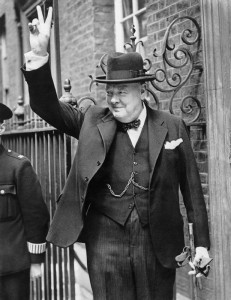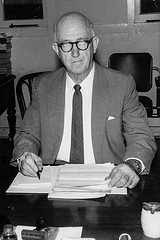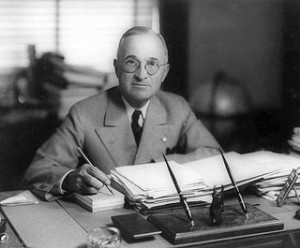 Sitting at lunch yesterday with one our most prolific authors on LeadershipVoices.com and with a new author who is going to be providing some interesting content in the coming days, our conversation was about leadership and the leadership crisis in our culture today. One of my hypotheses is that we are just one generation away from losing our society and our culture due to the lack of leadership skills today. One of my lunch companions had a much more optimistic view that we are several generations away. All I know for sure is that there is a distinct lack of leadership exhibited today. And it “seems” that there were better leaders and more leadership skills in the past.
Sitting at lunch yesterday with one our most prolific authors on LeadershipVoices.com and with a new author who is going to be providing some interesting content in the coming days, our conversation was about leadership and the leadership crisis in our culture today. One of my hypotheses is that we are just one generation away from losing our society and our culture due to the lack of leadership skills today. One of my lunch companions had a much more optimistic view that we are several generations away. All I know for sure is that there is a distinct lack of leadership exhibited today. And it “seems” that there were better leaders and more leadership skills in the past.
And it seems that leaders of the past almost always seem more effective than those of today. Perhaps it is a perceptual bias: We long for what we don’t have, and mythologize what we used to have. But even taking this bias into consideration, many of today’s leaders don’t seem to measure up to our expectations.
According to a survey conducted by the Harvard Kennedy School several years ago, 68% of Americans believe that there is a “leadership crisis” in the country; and leaders in only four out of thirteen sectors polled inspire above average confidence. Those sectors were the military, the Supreme Court, non-profit organizations, and medical institutions. Leaders of the news media, Congress, and Wall Street receive the lowest scores. Who is surprised by this?
 My parents used to tell me that the leaders of their day not only inspired confidence, but respect and reverence as well. They talked about Roosevelt, Churchill, Eisenhower, Gandhi, and others of that generation as larger than life figures. Growing up, I had the same impressions of John and Robert Kennedy, Martin Luther King, Margaret Thatcher, Ronald Reagan, Mikhail Gorbachev, Lech Walesa, and others. Sure they had their flaws, but they were courageous and decisive, and could communicate in ways that made it clear what they stood for.
My parents used to tell me that the leaders of their day not only inspired confidence, but respect and reverence as well. They talked about Roosevelt, Churchill, Eisenhower, Gandhi, and others of that generation as larger than life figures. Growing up, I had the same impressions of John and Robert Kennedy, Martin Luther King, Margaret Thatcher, Ronald Reagan, Mikhail Gorbachev, Lech Walesa, and others. Sure they had their flaws, but they were courageous and decisive, and could communicate in ways that made it clear what they stood for.
But today’s public figures don’t seem to inspire the same confidence. According to recent Gallup figures, only 29% of Americans think that President Obama is doing a good job; and only 7% have a favorable view of Congress.
The irony is it’s likely that more money has been spent on leadership development in the last two decades — in both the public and private sectors — than was probably spent in the previous ten decades combined (admittedly I’m guessing here; no figures seem to be available). All I know for sure is that my personal leadership consulting practice is up this year over last year and that year was up over the previous year. So why are we not turning out better leaders across the board? Let me suggest two possibilities — and perhaps readers will add others:
Click here to read the rest of the article »
Caring is sharing. Will you please share this with your network?
 Being involved in the realm of leadership coaching and leadership development, I choose to observe things that many do not take notice of. And there is a constant that is visible to all those who would look closely.
Being involved in the realm of leadership coaching and leadership development, I choose to observe things that many do not take notice of. And there is a constant that is visible to all those who would look closely. One of his most well-known works, On Becoming a Leader, originally published in 1989, lays the foundation that a leader must be authentic. He uses words that speak of the need to
One of his most well-known works, On Becoming a Leader, originally published in 1989, lays the foundation that a leader must be authentic. He uses words that speak of the need to 















